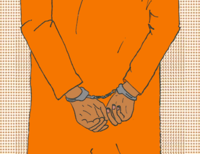HELP US KEEP YOU INFORMED
The Prison Policy Initiative is your go-to source for timely and actionable criminal justice data, and we work hard to get you the information you need on pages like this one.
We need your help to do more. Can you support your favorite resource with a gift today?
With gratitude,
Peter Wagner, Executive DirectorDonate
We need your help to do more. Can you support your favorite resource with a gift today?
With gratitude,
Peter Wagner, Executive DirectorDonate
Research Library
Our mission is to empower activists, journalists, and policymakers to shape effective criminal justice policy, so we go beyond our original reports and analyses to curate a database of virtually all the empirical criminal justice research available online.
Tips: If you know what you are looking for, you may also search the database. We also have an email newsletter (at right)(at bottom) for new research library updates.
- COVID-19 (79) The pandemic’s impact on prisons and jails
- Community Impact (271) Impact of justice system on communities, includes housing, employment, schools
- Conditions of Confinement (416)
- Crime and Crime Rates (384) Information on type of crime/frequency
- Death Penalty (164) Data, policy, and analysis of the death penalty
- Disability (30)
- Drug Policy (234) Analysis of drug policy and its effects on the prison system
- Economics of Incarceration (308) The economic drivers and consequences of mass incarceration
- Education (129) Correctional education and the school-to-prison pipeline
- Families (147) The justice system's impact on families.
- Felon Disenfranchisement (105) Barring people from the polls because of criminal convictions
- General (163) Atlases, indices, and broad-based source material
- Gun Control (50) Statistics on gun violence, suggestions for gun control
- Health impact (363) Public health, access to healthcare, and mortality
- Immigration (69) Detainment practices and statistics
- Incarceration Rates Growth Causes (479)
- International Incarceration Comparisons (58)
- Jails (283) Information and data on jails
- LGBT (28)
- Mental Health (174) Policies and practices surrounding mental health
- Police and Policing (345)
- Poverty and wealth (149)
- Pretrial Detention (161) Exploring cost and outcome of detaining people before trial or deportation (ie. instead of bail or other alternatives)
- Prison Gerrymandering (34) Research on prison-based gerrymandering (see also www.prisonersofthecensus.org)
- Privatization (101)
- Probation and parole (120)
- Public Opinion (81)
- Race and ethnicity (414)
- Recidivism and Reentry (393) What makes people more or less likely to succeed upon release?
- Sentencing Policy and Practices (272) Relating to sentencing policy.
- Sexual offenses (51)
- Trials (232) Statistics about the court system and its processes
- Women (210) Impact of the criminal justice system on women
- Youth (488) Criminal justice and young persons, the prison system’s effect on their lives
Can't find what you are looking for?
Enter one word from the title, author or topic to search the library:
Some of the most recently added reports are:
Monday, December 2 2024:
- The effect of pollution on crime: Evidence from data on particulate matter and ozone, Jesse Burkhardt et al. November, 2019.
- Crime is in the Air: The Contemporaneous Relationship between Air Pollution and Crime, Malvina Bondy, Sefi Roth, and Lutz Sager. April, 2018.
- Nutritional Criminology: Why the Emerging Research on Ultra-Processed Food Matters to Health and Justice, Susan L. Prescott et al. January, 2024.
- Cancer Mortality in Louisiana's Correctional System, 2015-2021, Totadri Dhimal et al. November, 2024.
Friday, November 29 2024:
- Disability rights and disability justice in prison: the limits of state-protected rights and the possibilities of mutual support, Stephen Meyers. September, 2024.
- Equity for Whom? How Private Equity and the Punishment Bureaucracy Exploit Disabled People, Disability Rights Education & Defense Fund. November, 2024.
- Factors Associated With the Availability of Medications for Opioid Use Disorder in US Jails, Elizabeth Flanagan Balawajder et al. September, 2024.
- "I Don't Believe You, So You Might as Well Get Used to It": The Myth of PREA Zero Tolerance in Texas Prisons, Trans Pride Initiative. July, 2018.
- Understanding How Supervision Conditions are Set for People on Parole and Probation, Robina Institute of Criminal Law and Criminal Justice. April, 2024.
- State Courts Play a Key Role in American Life, Pew Charitable Trusts. October, 2024.
Monday, November 18 2024:
- The Drug Treatment Debate: Why Accessible and Voluntary Treatment Wins Out Over Forced, Drug Policy Alliance. September, 2024.
- Cautionary jails: Deconstructing the three "C"s of jail construction arguments, Prison Policy Initiative. February, 2024.
- Stop Cop Cities; Invest in Public Health Solutions, Human Impact Partners. October, 2024.
- Zombie politics: The return of failed criminal legal system policies in 2023 - and how to fight back, Prison Policy Initiative. January, 2024.



